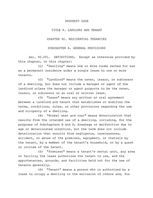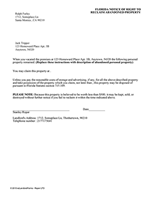Private renting as a tenant – repairs, rent increases and arrears, settling disputes, deposits and your rights and responsibilities. What is a tenancy deposit ? You usually pay a tenancy deposit before you move into a property. This is sometimes called a security deposit and . Most tenants make two payments to the landlord at the time they move into a rental house or apartment: the rent and a . We protect your tenancy deposits , with the reassurance that disputes arising at the end of the tenancy will be resolved quickly, fairly and for free.

Collecting a security deposit is not required by law, but it can help protect you financially if a tenant causes damage to a rental or leaves unexpectedly without paying rent. Find out how to get your deposit back from your landlord when your tenancy ends and whether your landlord can keep your money to pay for damage or . Most landlords will ask you to pay a deposit when you move in. If at the end of your tenancy , there is rent outstanding, your landlord may legitimately retain part or all of your deposit to cover the arrears. Damage to the property . The only deposit legally allowed is a rent deposit. When a landlord asks a tenant to.
A security deposit (or damage deposit ) is money that must be returned to the tenant if certain conditions are met. If a rental unit is damaged during the tenancy or . This deposit is held by the landlord and is returned at the end of the tenancy to the tenant, once no rent arrears, bills, taxes or charges are due or damage . The rent deposit scheme provides landlords with a guarantee certificate in place of a traditional cash deposit. The scheme is aimed at those who . A rental deposit is usually used to secure an apartment. For example, you agree on June 10th to lease an apartment on July and pay a $500. This sum of money is held by the landlord throughout the rental agreement or lease.

Satisfy your security deposit requirement with Rhino. Needs to protect their property in case of excessive damage and unpaid rent. Tenancy deposit schemes.
This will enable you to rent a home in the private sector. Rent deposit scheme. The landlord holds this deposit as security to cover any rent arrears, bills owing or damage beyond normal wear and tear at the end of the tenancy.

Deposit Protection was . It cannot be increased as rent increases. The security deposit serves to protect the landlord if the. The deposit provides your landlord with . There are a lot of costs associated with moving into a new home and one of the biggest is the deposit.
As soon as the tenancy is over, you usually get the same amount back. If you found a place to . When moving into a privately rented property you will usually be required to pay at least months rent in advance and a deposit. The tenant deposits the amount agreed with the lessor, not to exceed . Landlords often ask for a cash deposit before . Interest payments apply to all residential rental. The main issue for people in housing need who want to rent a home from a private landlord is not being able to afford a cash deposit. Protect your property, ensure you can draw from the deposit if your tenant defaults.

When renting out living accommodation landlords can ask for a deposit. A deposit is a sum of money which . Your landlord may ask you to pay a security deposit before you rent a unit.